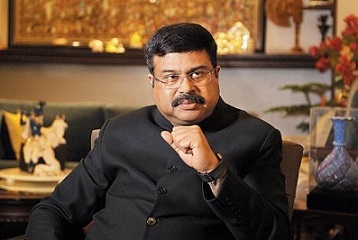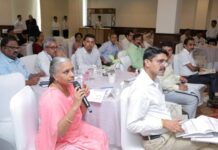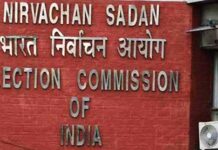By Our Correspondent
NEW DELHI/BHUBANESWAR: Union Minister for Petroleum and Natural Gas and Steel Dharmendra Pradhan in a written reply in the Rajya Sabha o Wednesday said that the Public Sector Oil Marketing Companies (OMCs) have informed that expansion of Retail Outlet network is a continuous process to ensure adequate availability of motoring fuels like petrol and diesel throughout the country. Public Sector OMCs have issued advertisements for award of Retail Outlet dealerships on 25.11.2018 and 14.12.2018.
As on 01.01.2020, Public Sector OMCs have 60,227 retail outlets in the country.Further, Petroleum & Natural Gas Regulatory Board (PNGRB) is the authority to grant authorization to the entities for the development of City Gas Distribution (CGD) network in Geographical Areas (GAs). Providing Piped Natural Gas Connection (PNG) and establishment of Compressed Natural Gas (CNG) Stations are the part of the development of CGD network and the same are carried out by the entities authorized by PNGRB, as per the work plan. As on 01.02.2020, a total of 1,989 CNG Stations have been set up in the country.
A Committee headed by Vice-chairman, NITI Aayog and comprising of Cabinet Secretary, Chief Executive Officer, NITI Aayog, Secretary, Ministry of Petroleum and Natural Gas, Secretary, Department of Economic Affairs and Chairman & Managing Director of Oil and Natural Gas Corporation was constituted in October, 2018 for suggesting reforms in Exploration & Production (E&P) Sector to enhance domestic Oil & Gas Exploration and Production. The Committee, in its report inter-alia recommended constitution of an Empowered Coordination Committee (ECC) under the chairmanship of Cabinet Secretary for streamlining and expediting grant of approval/clearances.
Empowered Coordination Committee (ECC) was constituted in May, 2019 under the Chairmanship of Cabinet Secretary, for considering matters relating to delay in granting various clearances, approvals etc. Three meetings of the committee have been held so far and issues related to delay/non-grant of Petroleum Exploration Licenses, environmental clearance issues and defence clearance issues have been taken up with other Ministries/departments and State Governments for expeditious resolution of the pending issues. Pursuant to the ECC meetings, following steps have been taken:-
Petroleum Exploration Licenses (PELs) have been granted in all Blocks awarded under Open Acreage Licensing Policy Round-I in the states of Assam, Madhya Pradesh, Gujarat & some blocks of Arunachal Pradesh,Petroleum Mining Leases have been granted for many Discovered Small Fields and Nomination blocks in Assam, Tripura, Gujarat and Andhra Pradesh,
Ministry of Defence and Department of Space have agreed to grant additional area for exploration,
Notification of Eco Sensitive Zone (ESZ) has already been issued around 16 protected areas.
Natural Gas being an alternative cleaner fossil fuel has a major role in catering the growing energy demand in a sustainable manner. To increase the share of gas in the primary energy mix of the country, Government is progressively taking steps to enhance domestic gas production and develop requisite gas infrastructure including gas pipelines, city gas distribution networks and import Liquefied Natural Gas (LNG) terminals. The initiatives to develop eco-system of gas infrastructure across the country have a potential of investment of about Rs. 2.00 lakh crore in Gas Grid, LNG Terminal and City Gas Distribution (CGD) networks in next 5-8 years.
As per the present policy, Government is meeting the entire requirement of CNG (Transport) and PNG (Domestic) segment of CGD networks by supplying domestic gas, which is cheaper than imported gas.
Government has taken several policy measures/initiatives to enhance exploration & production of oil and gas in the country which include:
Policy for Relaxations, Extensions and Clarifications under Production Sharing Contract (PSC) regime for early monetization of hydrocarbon discoveries, 2014
Hdrocarbon Exploration and Licensing Policy, 2016. Policy for Extension of Production Sharing Contracts, 2016 and 2017 ,Policy for early monetization of Coal Bed Methane, 2017, Setting up of National Data Repository, 2017, of Unapprised areas in Sedimentary Basins, Re-assessment of Hydrocarbon Resources, Policy framework to streamline the working of Production Sharing Contracts in Pre-NELP and NELP Blocks, 2018, Policy to Promote and Incentivize Enhanced Recovery Methods for Oil and Gas Policy framework for exploration and exploitation of Unconventional Hydrocarbons under existing Production Sharing Contracts, Coal Bed Methane contracts and Nomination fields, 2018.
Grant of Marketing including pricing freedom, on natural gas production from High Pressure-High Temperature (HP-HT) reservoirs and deepwater and ultra deepwater areas (with ceiling), gas produced from CBM blocks, blocks awarded under Hydrocarbon Exploration and Licensing Policy (HELP) and Discovered Small Fields (DSF) Policy, commercial gas produced from North-Eastern Region (NER) on or after July 01, 2018 and also in those new gas discoveries whose Field Development Plan (FDP) has been approved after February, 2019. To incentivize additional gas production from Administered Price Mechanism (APM) fields, reduction in royalty by 10% of the applicable royalty has also been granted on the additional production over and above business-as-usual scenario.
In addition, Government in February, 2019 approved major reforms in exploration and licensing policy to enhance exploration activities, attract domestic and foreign investment in unexplored/unallocated areas of sedimentary basins and accelerate domestic production of oil and gas from existing fields.
The policy reforms inter alia aim to boost exploration activities with greater weightage to work programme, simplified fiscal and contractual terms, bidding of exploration blocks under Category II and III sedimentary basins without any production or revenue sharing to Government. Further, reforms envisage simplified fiscal incentives and incentivizing gas production including marketing and pricing freedom.
The policy also provides more functional freedom to National Oil Companies for collaboration and private sector participation for production enhancement methods in nomination fields. Streamlining approval processes and promoting ease of doing business including electronic single window mechanism is also an important aspect of policy reforms.






























